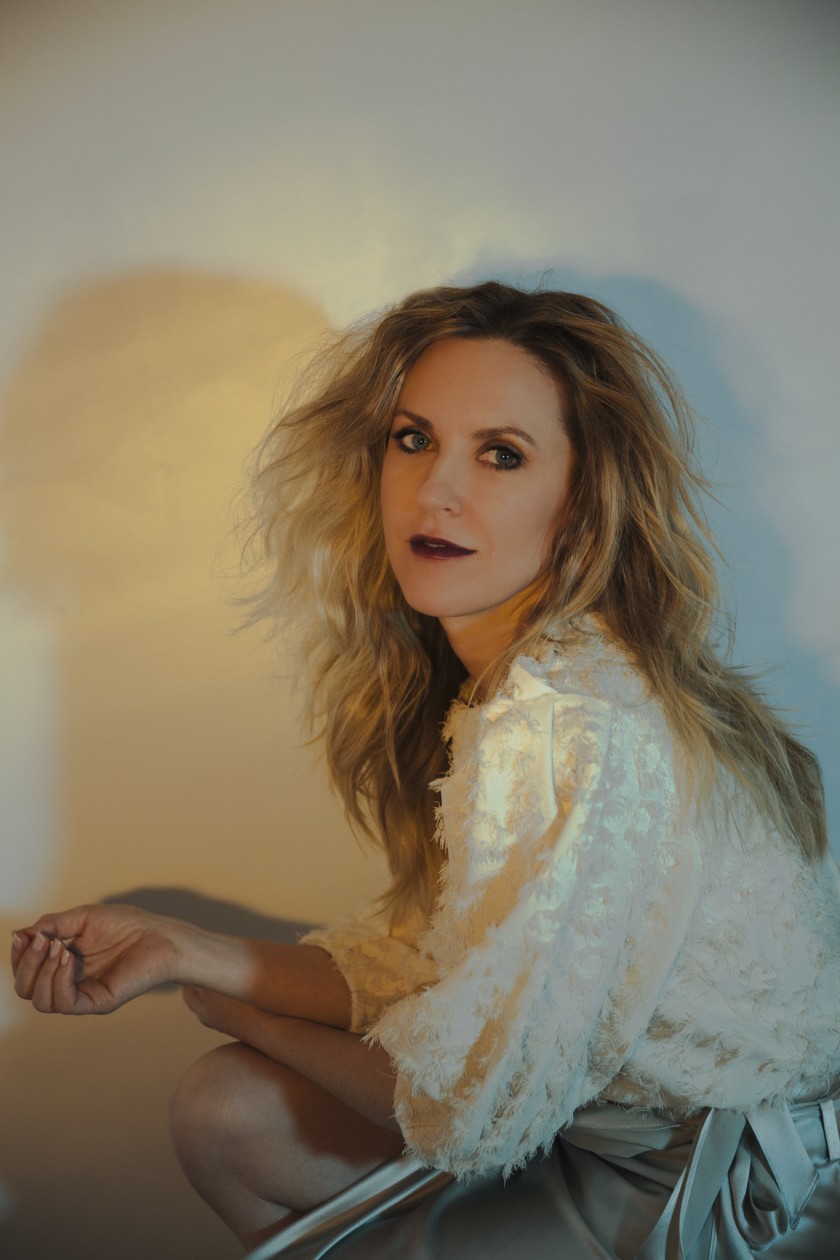By Annie Zaleski
Salon, May 5, 2018
In the last 25 years, thousands of words have been spilled about the impact, importance and genius of Liz Phair’s 1993 debut album, “Exile In Guyville.” There’s a good reason for that: Dusky guitar tones, intricate riffs and spare percussion buoy Phair’s voice and words, creating vivid, confessional songs that examine not just the vagaries of relating and communicating but also the power that comes with carving out a space for yourself in the world.
On Friday (May 4), Matador Records released “Girly-Sound To Guyville: The 25th Anniversary,” featuring a remastered version of “Exile In Guyville” and the complete set of “The Girly-Sound Tapes,” the legendary demos that first brought Phair notoriety. Diving into these homespun tapes today is a satisfying exercise: The lo-fi approach lends itself well to intimate nostalgia and cutting melancholy, and the unselfconscious nature of Phair’s songwriting still resonates deeply.Advertisement:
Phair called up Salon to reminisce about the past — specifically “Guyville” and “The Girly-Sound Tapes” — and also chat about the future: the record she’s been working on with Ryan Adams, which is coming out this year.
The “Girly-Sound” tapes that were used for the reissue — were those yours? Or did someone else dig them up and have them lying around?
No, we had put out the call. It was kind of a big event. It was a six-to-eight-month event to find actual usable, magnetic tape cassettes that were the original ones. [Phair’s friend] Tae Won Yu had the most impressive archival collection. I don’t know if [musician] Chris Brokaw ever found his in a storage space, and then someone else got in touch that they had some. Somewhere between the multiple things that Matador found, they found the versions of all the songs, which is a miracle — a miracle, I tell you. We started to do the project before we even knew if we could find them. I certainly didn’t have them.
I wondered about that. The third tape was circulating for years, and I think it was a different track listing, right? It wasn’t even complete.
I’m not even sure. I knew there was more than one crisis point. [Laughs.] More than one, like, “Ahhh!” We didn’t go so far as to put an all-points-bulletin out to anyone who might have them; I think we stayed within private channels. But it was not a no-brainer, and it certainly was nail-biting for part of the time.
When you went back and listened to the tapes, what kind of memories were dredged up for you?
There’s the embarrassment of how young and silly some of it was. When I was learning how to play them all, I pitched them all over the place. What I mean is, I record the song, and then I speed up the tracks for the “Girly-Sound” [tape] so it would sound like a little tiny girl. That means when you’re trying to perform them live, or re-learn what you’re playing, I can’t figure out some of the stuff that I’m playing, because it’s not what you would actually hear on the fret of the guitar; it’s actually sped up somewhere random. There’s no actual number: “Oh, I sped up three dBs, so now the E is an A, or the D is a C.” It’s just completely random.
Basically, when I try to re-learn this material, I just take a capo and I stick it somewhere on the guitar and start strumming what I think I was playing and try to find a voice match. Every couple of days I say something from that movie, “Shakespeare in Love,” where he says, “How’s it all gonna work out?” And he’s like, “I don’t know! It’s a mystery!”
I hear the playfulness of that early time. I did not think anyone would ever hear this stuff. This is stuff I did just for me. I might have come home drunk one night and wanted to cry into my guitar and write a song, or maybe I was sort of goofing around. They were so unselfconscious and so unprofessional. That is both a lovely thing and also just mortifying.
As a writer, there’s some stuff I wrote when I was really young, and you just cringe and think “How can I bury this?” You don’t have that luxury though, because people have built these tapes up into being this mythical totem.
I drag all my embarrassment along behind me forever. [Laughs.] I’ve been living the internet world for a lot longer than the internet was around.
That is very true. Was there anything surprising when you went back and listened to your younger self?
I was surprised with how political a lot of the lyrics were. Oberlin College was definitely a politically active campus, so it shouldn’t have been a surprise, but it did surprise me how a lot of the issues I’m talking about are completely relevant, even now, 25-30 years later, if we’re talking “Girly-Sound.” It’s troubling to think we’re still about to get into a war; we’re still talking about the Middle East; we’re still talking about militarism and sexism.
That’s why I think that “Guyville” and the “Girly-Sound” tapes really still resonate with people, because the material, for lack of a better word, hasn’t aged. It’s still really relevant. And that’s really disheartening. It’s good and it’s bad.
It really is. We should have moved on, but we’re not. I guess maybe that also speaks to the timeless themes I chose, without even meaning to. There’s a thing about “Who am I, and why do these things keep happening to me?”
I know when you actually went to record “Exile In Guyville,” you once said it was like collage work. I thought that was such an interesting way of putting it, and putting together an album — and I think that’s a lot of the reason why the sound is so unique. Why else do you think it’s so unique?
[Co-producer] Brad Wood was really good about letting the spirit of the demos live in the recording. I think he has a less-is-more approach. He also had a jazz background, so he had a different take on it than another producer would have had, so that my weird chords and odd melodies — which are, essentially self-taught. I don’t know what I’m playing, I’m just making shapes with my fingers that sound good on the fret. He protected that, and he also didn’t want to clutter it up with a bunch of stuff that didn’t need to be there.I can remember him very distinctly talking about, like, “I don’t think this song needs a bass line.” He was very protective of the kernel of what the “Girly-Sound” tapes were. I was just unselfconscious; I didn’t know enough to be scared, and I didn’t know enough not to do it that way. . . . They let the weirdness of me live.
In hindsight, that was the best decision anyone made.
I think he still thinks that, too. He feels good about how he approached that. I think his jazz background played a lot into that, because I have an unusual sensibility. I like dissonance here and there. He pulled out the threads that I was putting in and made them into something kind of beautiful.
That makes sense if he has a jazz background, as dissonance wasn’t necessarily foreign to him. He could be like “OK, I can work with that.”
He did know how to work with that. And he knew how to do it tastefully. Casey [Rice] brought the rock. They both would be really experimental. That was the one thing we wanted — we wanted to be experimental. We would try things just for fun, and it wasn’t the way things were done, but they were equally enthusiastic about the do-it-yourself [spirit]. We made it work on no budget.
That’s the coolest thing too, when you say you didn’t know any better. There weren’t expectations; there wasn’t any pressure. It was like, we’re just going to do this. That’s such a special thing because you only get that once in your life, in a way.
Yeah, and I love those kind of things. It reminds me of “The Blair Witch [Project].” Especially in Hollywood, if you want to compete in a certain arena, you do need budgets, you do need a studio, you need production value. But as I try to teach my son, and I don’t think he’s quite caught on yet, you scale your production to whatever your resources are. There can be something brilliant done for nothing, but you just scale it. It’s like a fractal.
That’s a really interesting way of looking at it.
I want him to be able to tackle a creative project with whatever constraints he has, and be able to fit his mind to the parameters, not say it’s not doable. I don’t ever want to hear someone say they can’t do it. It’s like a telescope, the way it can keep expanding and contracting: Just expand or contract your expectations, but go use your soul, go use your sensibility, your taste and say something, in whatever allotted time or production budget you’ve got. I think they’re all of equal value because really what you’re trying to do is to communicate to people. The end result is, “Did you convey something? How do you communicate this? Was it effective? Did it reach them? Did it move them?” And that can be done at any scale.
“Guyville” certainly did — and “Guyville” still certainly does. Absolutely. What is the biggest misconception about the record that’s floating around?
I don’t know if it’s a misconception, I think it has to do with people not being as able to understand how it relates to [The Rolling Stones’] “Exile on Main Street.” That seems to be a real sticking point, and I’m gonna go as far as to say for men. They don’t get it, and it’s a very . . . I’ve taken to describe it as shipping. Do you know what shipping is?
Oh, yeah — like in fan fiction.
I’ll say something, like, “For one song, if the Rolling Stones are singing about a girl in the song, I play the girl now, and I’m sort of writing a song from that point of view,” right? I’m writing myself into their material. Or, on a different song of theirs, if [the Rolling Stones are] writing a song about some topic — I don’t know, like, wanting a friend to pick himself up out of a bad place — I’ll maybe write about my friend, picking himself [up].
I figured they were in a comparable music scene to my music scene. There were commonalities of where we were living at that point. I think for a lot of people, they’re like, “Well, wait, did you always do it that you were the girl? Or did you always?” And I’m like, “It’s art! I tried to make a bouquet. Sometimes I approached it this way, and sometimes I approached it this way, but I was engaging with the material at every turn.” But they want something linear, they want to know that if there was a solo then you did a solo, or if there were these instruments, then you [used these instruments]. They’re looking for something rigid and provable, and I don’t know what to tell them. I’d hate to see the art they collect.
It’s very true. They’re looking for the A to B comparison, that it’s direct. But it’s like, “Well, no . . .”
Intuitive. Intuitive communication is what I’m doing. I’m doing it intuitively. I’m doing it in an artistic, poetic manner, but I 1000 percent was absolutely thinking back and forth to those songs. And if you put them up, I can tell you what I was doing, what I was thinking. Even now, and I have a very bad memory. They want quantifiable, reproducible results, in which case they should probably not get into art.
You are working on music with Ryan Adams too. What’s the status of that? Is there a new record?
He’s been super busy, I’ve been super busy, and we’re just trying to book out the last week-and-a-half of work. We’re very close to finished.
That’s very exciting.
I’ll tell you what. Our original idea has morphed dramatically. In the beginning, we were gonna do a double album of “The White Album.” And it just, after Trump, it just, that’s just not the seriousness. . . . A lot of the songs on “The White Album” are playful and jokey-ish, folky-ish. They’ve got Americana threading through that. We kind of stalled out for a minute there, because it just didn’t feel like the right . . . is that weird? That the political climate changed my ability to do the project. The project kind of died, because it didn’t speak to where our souls were, and we couldn’t work on something that didn’t speak to the gravity of what we were feeling every day. We had to change. We had to go through a couple iterations to find our way back to maybe, like, a tight ten [songs] or something that speaks to what we’re feeling and what we need to put out. First time in my life the climate around — and it wasn’t directly in my personal life — massively affected my ability to do art.
I feel like that’s a very common theme. I’ve talked to a lot of artists over the last year or so, and it’s a very odd, singular time, in the way that their art is being influenced. It almost feels disrespectful, not to be either addressing it or doing something. It feels frivolous.
That’s exactly right. Frivolous is the right word. He f**ked up my project. It’s fine, it’s gonna be better. I mean, he f**ked with everything. [Laughs.]
What was the best part about working with Ryan Adams?
He is so charm city. Such a genius, musically. He can create a song out of thin air in front of you that’s brilliant and funny. He loves the Liz Phair that people ought to love, so he’s a really good quality control bullshit [detector] like, if I am being too clever, or whatever it is. What speaks to his soul about my music is the same thing that I would want . . . that’s what speaks to my soul. He is right on target for what is best about me, I guess. That’s a pretty big compliment for a producer.
It sounds like he’s looking at you as an artist, who you are, and not what people want you to be, or think you are, or something like that.
Yeah. I’m very confident if he flags it as excellent, then it is. And if he flags it as sub-par, it is. I don’t always agree — sometimes I’ll come back if it’s important to me — but I’m speaking at a very high level of understanding between us, which is nice. The rapport is good. He has a different way of working, which is unusual and new for me, but it’s valuable.
Featured Image: Liz Phair (Elizabeth Weinberg)








